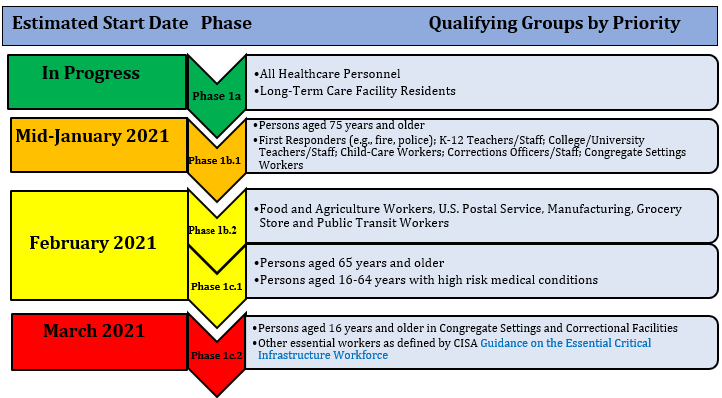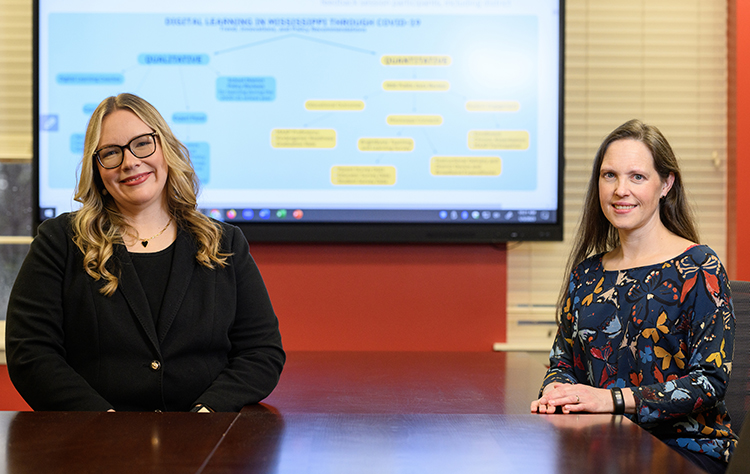
Vaccination Timeline
- The Mississippi State Department of Health continues to receive and distribute both Pfizer and Moderna vaccine to healthcare workers and the residents and staff of long-term care facilities. Vaccinating these groups protects our highest-risk population and helps ensure that the state’s health system can continue to treat COVID-19 patients safely and protect all patients from COVID-19 infection.
- As more vaccine arrives over the coming weeks, vaccinations will be expanded to other groups such as older adults, essential workers, and those with chronic diseases which raise their risk of serious illness from COVID-19.
- While future vaccine shipments are hard to predict, vaccinations for the general public will probably not be available for several months.
- In the meantime, everyone should continue to adhere to safety guidelines such as social distancing to stop the increasing spread of COVID-19 in the state, including those who have been vaccinated.
Mississippi Vaccination Phases
Mississippi is following a phased approach to prioritizing COVID-19 vaccinations. Each phase balances the protection of those most at risk from COVID-19 with the protection of those who maintain essential functions of the community such as healthcare, education, law enforcement, food supply and transportation.

We are currently in Phase 1a. Healthcare workers include a broad range of physicians, nurses, and clinical and facility staff in any setting where COVID-19 exposure is a risk. Long-term care facilities include nursing homes, personal care homes, assisted living, and similar group living settings for older adults or those with special health conditions.
As vaccine supplies increase, vaccination will be expanded to vulnerable adults and workforce members most essential to basic community functions such as law enforcement, first responders, food supply and education.
Phase 1b
- Frontline essential workers such as fire fighters, police officers, corrections officers, food and agricultural workers, United States Postal Service workers, manufacturing workers, grocery store workers, public transit workers, and those who work in the educational sector (teachers, support staff, and daycare workers.)
- People aged 75 years and older because they are at high risk of hospitalization, illness, and death from COVID-19. People aged 75 years and older who are also residents of long-term care facilities should be offered vaccination in Phase 1a.
Phase 1c
- People aged 65—74 years because they are at high risk of hospitalization, illness, and death from COVID-19. People aged 65—74 years who are also residents of long-term care facilities should be offered vaccination in Phase 1a.
- People aged 16—64 years with underlying medical conditions which increase the risk of serious, life-threatening complications from COVID-19.
- Other essential workers, such as people who work in transportation and logistics, food service, housing construction and finance, information technology, communications, energy, law, media, public safety, and public health.
Who Can Be Vaccinated
- Individuals 16 and older can receive the Pfizer vaccine, and those 18 and over can receive the Moderna vaccine.
- Pregnant women, lactating women and those who are immunocompromised may take the vaccine; however, consultation with your healthcare provider is recommended.
Who Should Not Be Vaccinated
- You should not take the vaccine if you have had severe reactions from previous vaccines or injectable medications.
When and Where You Can Be Vaccinated
- Many health facilities will arrange vaccinations for their staff on-site. Check with your facility if you are a healthcare worker.
- Healthcare workers can also be vaccinated at drive-through vaccination sites beginning January 4, 2021.
- Look for MSDH’s announcements on our website and in the news on when vaccinations are available for other groups, where to go for your vaccination, and how to make an appointment.
If You Have Already Had COVID-19
- You can be vaccinated if you have tested positive for COVID-19 if you wait until your isolation period is over and your symptoms have significantly improved.
What to Expect
- Two vaccinations, 21 to 28 days apart (depending on type of vaccine) will be required for full effectiveness.
- Like most vaccines, you should expect some soreness and fatigue for up to a day after vaccination, a sign that the body is developing a proper immune response.
- Large-scale testing of the vaccine has found no major side effects to the vaccine



